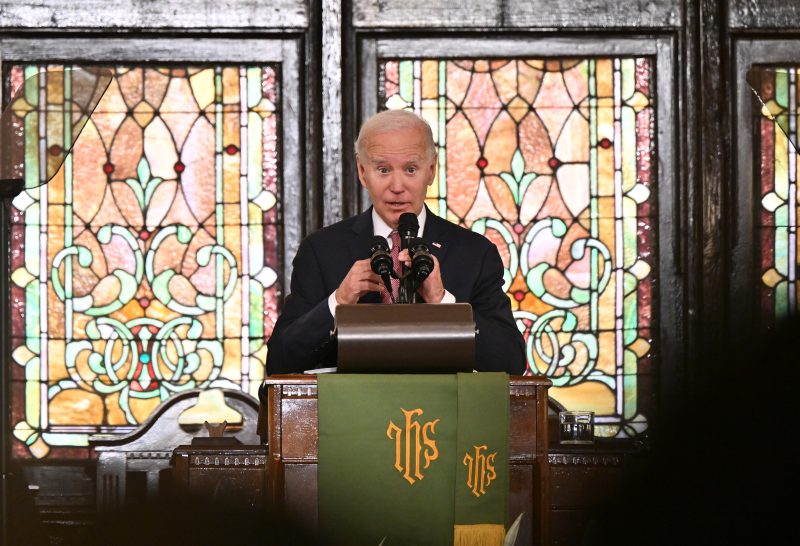President Biden has begun the 2024 election year with a concerted effort to train the nation’s eyes on his presumptive opponent, Donald Trump.
Biden delivered a speech Friday marking the third anniversary of the Jan. 6, 2021, insurrection and pitching Trump as a threat to democracy. On Monday, he spoke at the historically Black church in South Carolina that was the site of a racist massacre and accused Trump’s MAGA Republicans of trying to erase history.
These and other Biden campaign events spotlight one of the biggest questions of the 2024 race, as general-election polls lean in Trump’s direction and Biden lags with such key groups as young and Black voters: Can Biden lure people to vote against Trump — if not necessarily for Biden — as they did in 2020?
He plainly needs to.
Multiple polls have shown enthusiasm for Biden’s candidacy at a low point.
A USA Today/Suffolk University poll last week asked primary voters from each party to rate how enthusiastic they were to vote for their respective front-runners, Biden and Trump, if they became the nominee.
While 44 percent of GOP primary voters gave Trump a 10 (“very enthusiastic”), just 18 percent of Democratic primary voters gave Biden a 10. Nearly half of Democratic primary voters were at a 6 or lower.
An AP-NORC poll last month showed 65 percent of Republicans were “very” or “somewhat” satisfied with Trump as their nominee, compared with 49 percent when it came to Democrats and Biden. (Independents were also less satisfied with Biden as the Democratic nominee than they were with Trump as the GOP nominee.)
A Monmouth University poll in September showed 47 percent of Republicans were “very enthusiastic” about Trump, compared with 29 percent of Democrats who were “very enthusiastic” about Biden.
The other poll that really drives this home is from November. NBC News asked those planning to vote for Biden whether their vote was more for him or against Trump. Just 31 percent said it was more for Biden, while twice as many — 63 percent — said it more against Trump
That’s a brand of negative partisanship we simply haven’t seen in the 21st century. In NBC polls dating to 2004, the lowest percentage to say they were mostly affirmatively voting for their party’s nominee was 35 percent in mid-2012. It was 36 percent for Biden in his 2020 matchup with Trump in an August 2020 NBC poll.
One way to look at this is that Biden still won in 2020. The bogeyman that was Trump proved to be just that compelling.
But the contest was closer than a lot of people recognize. Also, with Trump’s presidency four years behind us, it’s a tougher trick to rely on people voting so strongly against him (memories fade), when you’re the incumbent with a record, and when voters find you less palatable. (Biden’s favorable rating in exit polls on Election Day 2020 was 52 percent, compared with about 40 percent today.)
Because of the impact of negative partisanship, polls generally show the percentage of Democrats and Republicans who say they’ll definitely vote is closer than the above numbers indicate. But Democrats have generally lagged on that, too. And a recent Marquette University Law School poll showed 60 percent of Republicans said they were “very enthusiastic” about voting in the 2024 election, compared with 38 percent of Democrats.
None of that means Biden can’t win with this setup. Part of the reason enthusiasm might be higher on the GOP side is that Republicans actually have a semi-competitive primary in which Trump supporters are being asked to cast crucial votes. Biden hasn’t had to run an active campaign to lock up the Democratic nomination. And, certainly, there could be plenty to remind people about what they didn’t like about Trump’s presidency if and when his criminal cases go to trial.
But, certainly, Biden having such a limited segment of his party excited to vote for him 10 months before the election is far from ideal.

